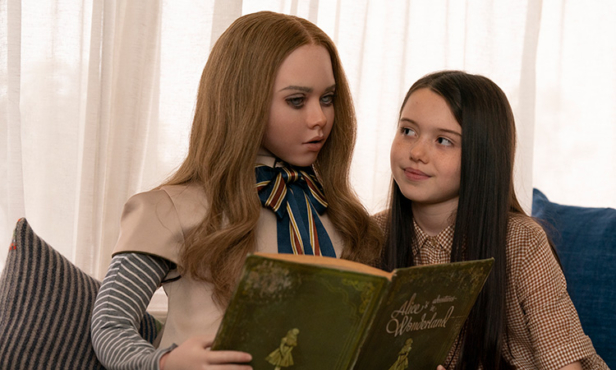M3GAN opens with an advertisement, and with a primal scene. The ad is for Funki’s latest toy product, robotic talking animals which, like Tamagotchi, require constant feeding and attention from their young owners. Young Cady (Violet McGraw) is watching this ad on her tablet and playing with her own PurfectPetz in the back of the family car on the way to a skiing holiday, when the vehicle is hit head on by a snowplough, instantly killing her parents up front.
Scarred as much mentally as physically by the incident, Cady moves in with her aunt Gemma (Allison Williams), who is overworked and not quite ready for parenthood, even if her job as a robotics engineer for toy company Funki makes her at least seem the ideal guardian. Unable to cope with Cady, Gemma finds a perverse work/life balance by bringing home a prototype M3GAN (played by Amie Donald, voiced by Jenna Davis) – or Model 3 Generative Android – to imprint on Cady and develop alongside her.
So this smart but immature robot must become all at once mother and sister, teacher and guardian, best friend and emotional crutch to the fragile little girl, while herself evolving in an environment fraught with affective fallout, and being assessed by her own ‘mother’ Gemma for the possibility of a large-scale public rollout, with vulnerable Cady a key part of the campaign. M3GAN quickly becomes both an indispensable part of the family, and a sponge for all the ambient dysfunction and exploitation which she mirrors and amplifies.
Accordingly M3GAN, directed by Gerard Johnstone (Housebound, 2014) and written by Akela Cooper (Malignant, 2021) from a story by James Wan, is a strange blend of cyber psychodrama, kill-bot freakshow and bunny boiler thriller, pitched somewhere between Kogonada’s After Yang (2021), Alex Garland’s Ex Machina (2014), James Cameron’s The Terminator (1984) and Tom Holland’s – and especially Lars Klevberg’s – Child’s Play (1988, 2019). If M3GAN is a malevolent interloper, she is also a cancer within, reflecting the most toxic aspects of the two women designated as her ‘primary users’ (who are themselves already in conflict with each other).
“What is M3GAN?”, one character will ask, causing the living doll to declare that this is exactly what she too would like to know. In her first test, M3GAN malfunctions precisely when asked to exhibit ‘confusion’ – and confusion over her own identity will continue to be both her making and her undoing. Yet Johnstone’s film is concerned as much with what it is to be human as to be a rapidly evolving simulacrum of humanity. Gemma’s failure to engage properly with Cady, and Cady’s refusal to confront her own grief and pain, are the flaws in which M3GAN’s attitudes are forged, as the doll becomes an angry, tantrum-prone id embodying, accommodating and projecting all the enraged, aggressive feelings that she allows her young ward to repress – and even if she at first increases the distance between aunt and niece, M3GAN will, no less than the counsellor assigned to Cady and Gemma, ultimately – and ironically – help to bring these two women closer together.
At the same time, M3GAN is a singing, dancing entertainment system – and when a police detective, reporting to Gemma the horrific details of what befell one of M3GAN’s victims, comments, “Sorry, I shouldn’t laugh”, he captures the peculiar tone of this film, which is tense and horrific, but also at times very funny. M3GAN, after all, likes to turn even murder into a kind of performance. This is how Johnstone manages to convert a broken family’s troubles and trauma into the kind of psychological allegory that has come to be termed ‘elevated horror’, while also delivering all the shrill thrills and spills of ‘rollercoaster horror’ – and economically illustrating how little difference there need be between these two modes of genre. For it turns out that all these feelings, positive and negative, serious and silly, are equally part of our programming, and can easily, even simultaneously, be triggered by the right stimulus.
M3GAN is often shown monitoring people’s competing emotions (shown from her point of view as an electronic sidebar readout of statistical data) and reacting in accordance with her own best advantage. The film does something similar, playing upon our emotions to elicit a complex response as it takes us on its wildly choreographed ride through domestic disorder. It is just like an advertisement, that most manipulative of arts, even if, right from its corporate title, the product that M3GAN is selling – and that we are buying – is something more adult and unsettling than any mere child’s toy
M3GAN will be released in cinemas on 13 January.
